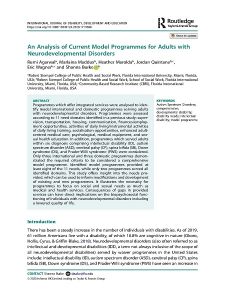An analysis of current model programmes for adults with neurodevelopmental disorders
 Abstract: Programmes which offer integrated services were analysed to identify model international and domestic programmes serving adults with neurodevelopmental disorders. Programmes were assessed according to 11 need domains identified in a previous study: supervision, transportation, housing, communication, finances/employment opportunities, activities of daily living/instrumental activities of daily living training, socialisation opportunities, enhanced adult-centred medical care, psychological, medical equipment, and sexual health education. In addition, programmes which served adults within six diagnosis comprising intellectual disability (ID), autism spectrum disorder (ASD), cerebral palsy (CP), spina bifida (SB), Down syndrome (DS), and Prader-Willi syndrome (PWS) were considered. Only three international and three domestic programmes demonstrated the required criteria to be considered a comprehensive model programme. Identified model programmes provided at least eight of the 11 needs, while only two programmes served all identified domains. This study offers insight into the needs provided, which can be used to inform modifications and development of existing and new programmes. It illustrates the necessity for programmes to focus on social and sexual needs as much as medical and health services. Consequences of gaps in provided services can have direct implications on the biopsychosocial functioning of individuals with neurodevelopmental disorders including a lowered quality of life.
Abstract: Programmes which offer integrated services were analysed to identify model international and domestic programmes serving adults with neurodevelopmental disorders. Programmes were assessed according to 11 need domains identified in a previous study: supervision, transportation, housing, communication, finances/employment opportunities, activities of daily living/instrumental activities of daily living training, socialisation opportunities, enhanced adult-centred medical care, psychological, medical equipment, and sexual health education. In addition, programmes which served adults within six diagnosis comprising intellectual disability (ID), autism spectrum disorder (ASD), cerebral palsy (CP), spina bifida (SB), Down syndrome (DS), and Prader-Willi syndrome (PWS) were considered. Only three international and three domestic programmes demonstrated the required criteria to be considered a comprehensive model programme. Identified model programmes provided at least eight of the 11 needs, while only two programmes served all identified domains. This study offers insight into the needs provided, which can be used to inform modifications and development of existing and new programmes. It illustrates the necessity for programmes to focus on social and sexual needs as much as medical and health services. Consequences of gaps in provided services can have direct implications on the biopsychosocial functioning of individuals with neurodevelopmental disorders including a lowered quality of life.
(2020). An analysis of current model programmes for adults with neurodevelopmental disorders, International Journal of Disability, Development and Education, doi: 10.1080/1034912X.2020.1719048

Recent Comments